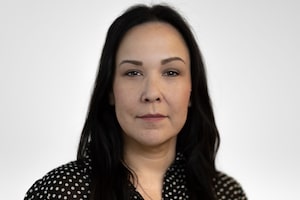Thunder Bay’s acting police chief, Dan Taddeo, says while many autopsies related to the service’s death investigations are already being performed in Toronto, it’s not sustainable.David Jackson/The Globe and Mail
All autopsies related to public death investigations in Thunder Bay will soon be conducted in Toronto after the local hospital that performs them phases out its services in the coming months, according to Ontario’s Chief Coroner’s Office – a move that could hamper an already strained police force investigating potential homicides.
Stephanie Rea, spokesperson with the Office of the Chief Coroner and the Ontario Forensic Pathology Service, told The Globe and Mail that the hospital has expressed its intent to withdraw the services to focus on health care priorities.
“Given this, in the short term, appropriate medicolegal autopsies will continue to be performed locally with some cases being referred to Toronto. Eventually, with the withdrawal of hospital service, all medicolegal autopsies from the region may need to be referred to the Forensic Services and Coroner’s Complex in Toronto,” Ms. Rea’s e-mail statement reads.
The hospital did not respond to an e-mail request.
Thunder Bay’s acting police chief, Dan Taddeo, says while many autopsies related to the service’s death investigations are already being performed in Toronto, it’s not sustainable. He said the move will create further delays that will have significant adverse affects on their investigations, and potentially traumatize families who are waiting for the remains of their loved ones, while creating an indignity to the deceased.
Acting Chief Taddeo said it’s an issue that should have been figured out long ago, since it was included in the list of recommendations in the 2018 Broken Trust report by the Office of the Independent Police Review Director that examined how the Thunder Bay Police Service handled death investigations of Indigenous people.
“The Ontario Forensic Pathology Service should establish a Forensic Pathology Unit in Thunder Bay, ideally housed alongside the Regional Coroner’s Office,” one of the recommendations in the report reads.
Acting Chief Taddeo said: “I really question what efforts have been made for the simple reason that, again, going on five years where a forensic pathologist has not been identified or recruited, and that includes incentives to relocate and come to Thunder Bay, given the issues the Broken Trust report has correctly identified.”
The Office of the Chief Coroner said that while there have been continuing conversations around a stand-alone unit, there is nothing concrete at this time. It also said that they have a strict turnaround time for performing autopsies and releasing bodies regardless of location in the province.
According to the province, 148 autopsies were completed in Thunder Bay last year while 262 were sent to the Provincial Forensic Pathology Unit in Toronto. In 2021, 139 autopsies were done in Thunder Bay, and 152 in Toronto.
Acting Chief Taddeo said 15 homicide investigations last year meant his officers were away for up to four days per trip to Toronto for post-mortems, straining an already understaffed major crimes unit. He said in addition to higher rates of homicide in the city, they are also faced with the highest rates of opioid-related deaths in the province, which they investigate as potential homicides because of toxic drug supplies connected to outside gangs. All those cases fall under the medicolegal umbrella of autopsies.
“We’re well aware of the influence of drug traffickers from the Greater Toronto Area. We arrested 150 persons not from Thunder Bay last year alone for these events,” he said.
Another Broken Trust recommendation states that “the Ontario Forensic Pathology Service should provide autopsy services compatible with cultural norms in Indigenous communities” and further supports the recruitment, training and hiring of forensic pathologist Kona Williams as a liaison.
Dr. Williams told The Globe that this never happened and that while she supports the need for a regional forensic pathology centre in Thunder Bay, she calls it a multi-faceted issue with challenges such as difficulty recruiting qualified health care professionals to the North and that forensic pathologists are already hard to come by in Canada.
Dr. Williams said experienced forensic pathologists with a background in Indigenous issues are crucial to navigating the forensic cases in Thunder Bay, but that they would need a facility, staff and funding to support the work.
 Willow Fiddler
Willow Fiddler